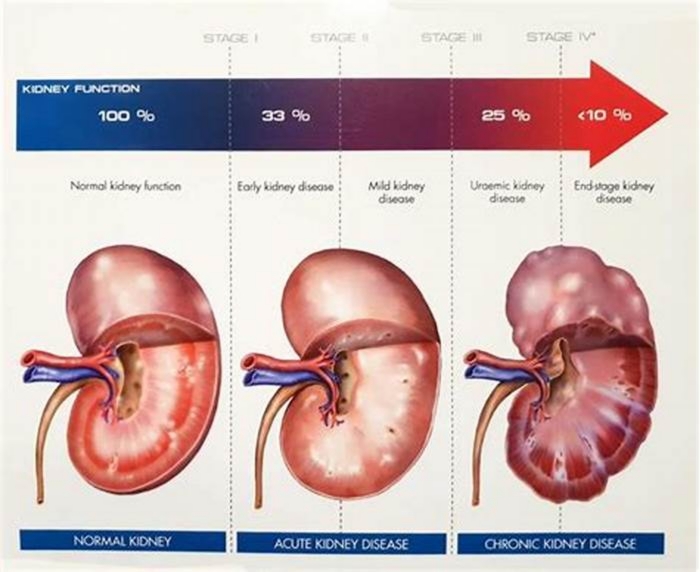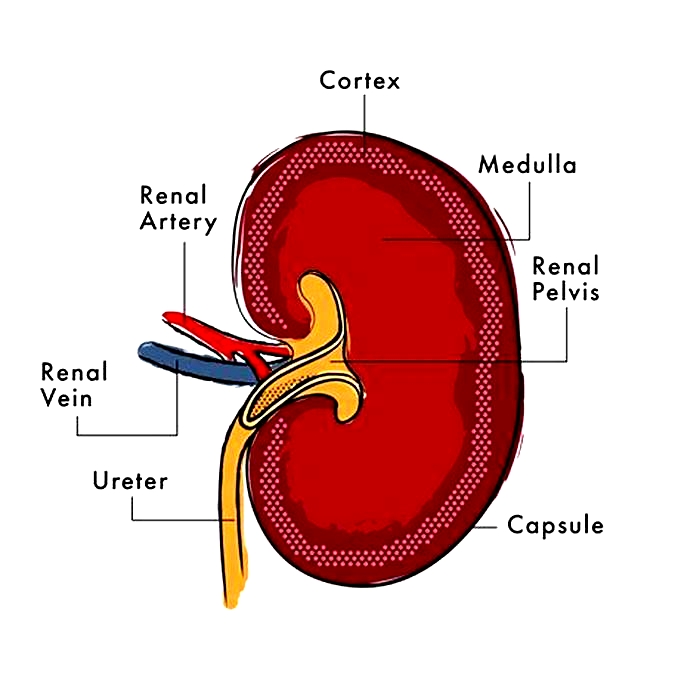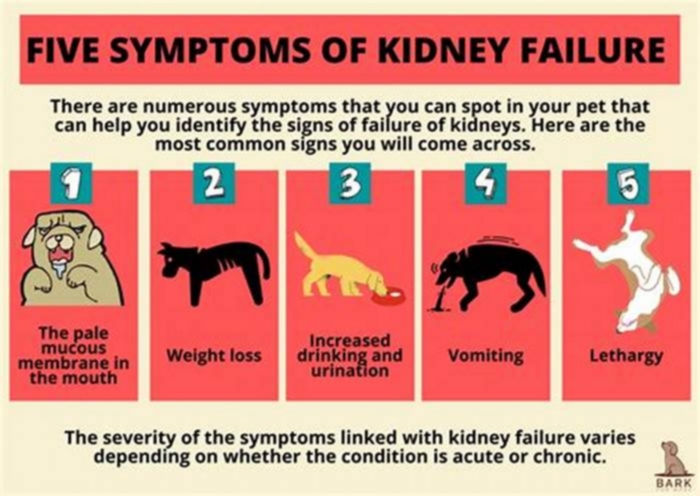why did my dog get kidney disease

10 Common Causes of Kidney Disease in Dogs

Kidney disease is a common problem of older dogs, affecting an estimated 10% of canines in their lifetimes1. There are a number of causes that may affect different age groups and have different consequences, ultimately though, chronic kidney disease (occurs over time) or acute kidney injury(occurs suddenly) will always have the same resultone sick pup. The signs of illness in your dog reflect the failure of the kidneys to do their many jobs well enough.Learn the basics of chronic kidney disease in dogs.Below you will find a brief description of ten common causes of kidney disease. These are the targets of your veterinarians testing:1. Damage to the kidney filters (glomerular disease)The glomerulus of the kidney (kidney filtration mechanism) is commonly involved in canine kidney disease. Early on, we expect no signs of illness, but since glomerular disease may be caused by infections (like Lyme disease) or cancer, amongst other things, time can make the problems worse. Over time, inflammation, in the glomerulus of the kidney, damages the surrounding kidney tissues, creating the chronic kidney disease that makes your dog feel sick.
Learn more about glomerular disease in dogs.
2. Infection of kidney tissues (pyelonephritis)Infection of kidney tissues with bacteria, or rarely, fungal organisms, is one of the kidney diseases that may have a more favorable outcome, so your veterinarian will be on the lookout for it. Our goal with pyelonephritis is to kill the bacteria that can cause the damaging inflammation. This should limit progression of any chronic kidney disease or assist with recovery from an acute kidney injury. A bacterial urine culture and susceptibility can verify the infection and identify which antibiotic might work the best.3. Kidney stones (nephrolithiasis)Kidney stones can be the product of chronic bacterial infection, genetics or diseases that alter blood or urine characteristics. Nephro (kidney) liths (stones) dont seem to cause dogs much pain, but this can change if they cause blockage within the kidney or its collecting ducts; it can also change if they contribute to infection (see pyelonephritis).
Learn more about kidney stones in dogs.4. Kidney blockage (ureteral obstruction with hydronephrosis)Kidney stones can fragment and be carried along with urine into the ureter, the long narrow tube that connects each kidney to the urinary bladder. They are probably painful during their transit, but the bigger concern is the consequence to the kidney if they become lodged there, causing partial or complete blockage. New urine cannot exit the kidney easily and it backs up, causing the kidneys to swell. With enough pressure, the kidneys enlarge (hydronephrosis) and become damaged. If both ureters obstruct at the same time, it can prove disastrous.
5. Damage to kidney tubules (tubulointerstitial disease)Inflammation and damage to the kidney tubules and supporting tissues commonly leads to chronic kidney disease. In many cases there is no identified cause, and thus no option for specific treatment. This type of kidney disease can only be confirmed by microscopic examination of a kidney biopsy specimen, but biopsies are not usually recommended.6. Bacterial infection (leptospirosis)Bacterial infection with leptospires causes kidney disease and other organ challenges in dogs and people all over the world. Normally, the effects of leptospirosis will be quite sudden and cause an acute kidney injury. Occasionally, the infection might cause chronic kidney disease. Quick recognition of this highly treatable disease should lead to a better outcome and protect your dogs friends and family (YOU!) from becoming infected by contact with urine or other body fluids.
Learn more about leptospirosis in dogs.
7. ToxinsLots of household items can damage the kidneys, not just antifreeze. Ordinary table foods like grapes and raisins; certain commercial jerky treat products; common OTC medications like aspirin or other nonsteroidals (NSAIDs); or prescribed medications can all cause kidney disease. Venoms, pesticides and heavy metals are less common toxins. We know dogs like to lick stuff, eat stuff, roll in stuff or bathe in stuff, but that can put them at real risk. To reduce your buddys risk of kidney injury, consider limiting his free-roaming behaviors and refrain from giving him any medications without discussing it first with your veterinarian.
See the top 5 most damaging kidney toxins for dogs.
If you have any reason to believe your dog has been poisoned, contact your veterinarian or an emergency veterinarian right away. You may also contact:
8. CancerFortunately, kidney cancer is not very common in dogs. Unfortunately, treatment options for kidney cancer are rather limited. Solitary tumors affecting only one kidney can be removed by surgery with a good outcome, if the cancer is benign or has not spread to other parts of the body (including the opposite kidney). Your dog only needs one good kidney to function normally. If the cancer is more widespread, as usually occurs with lymphosarcoma, surgery will not be an option for cure. Microscopic analysis of a biopsy or small needle sample is needed for the correct diagnosis of cancer and appropriate treatment plans.
Learn 10 signs of cancer in dogs.
9. Protein issue (amyloidosis)Patients with amyloidosis lose function in certain organs, including the kidneys, because protein deposits replace the normal tissue. It is an uncommon consequence of chronic inflammation affecting other parts of the body. It may also be genetically programmed in some dog breeds. Amyloid deposits cannot be cleared away, and the functional kidney tissue that is lost cannot be replaced, so the prognosis is not good.
Learn more about amyloidosis in dogs.
10. Hereditary There are genetic links to various kinds of kidney disease for many purebred dogs. Some young dogs fail to develop normal kidneys, or have kidneys that are large and grape-like, with many fluid- filled cysts. These dogs show signs of kidney disease as youngsters. Other dogs with congenital problems of the glomerulus or with a predisposition to amyloidosis might only show signs or symptoms of kidney disease when theyre adults.
If you have any questions or concerns, you should always visit or call your veterinarian -- they are your best resource to ensure the health and well-being of your pets.References:
- Brown SA. Renal dysfunction in small animals. The Merck Veterinary Manual website. Updated October 2013. Accessed January 14, 2015.
The Silent Killer: Kidney Failure in Chihuahuas
Are you a high and mighty owner of a beloved chihuahua? If so, youre probably constantly on the lookout for ways to keep your buddy delighted and healthy. Unfortunately, even with the greatest care, dogs can sometimes develop health issues, and one state that can affect chihuahuas is kidney failure.
In this blog post, well examine the causes and symptoms of kidney failure in chihuahuas, as well as the handling options and ways to handle the condition. By understanding more about kidney failure and how to care for your dog, you can give your chihuahua the best chance at a long and healthy life.
Lets start!
Understanding Kidney Failure In Chihuahuas: Possible Causes
Kidney failure in Chihuahuas, like in any other breed, can be caused by a variety of factors. Some possible causes of kidney failure in Chihuahuas include:
Age-related decline
The age-related decline is a normal part of the maturing process in all animals, including chihuahuas. As chihuahuas get older, their kidneys may become less able to function properly, which can lead to kidney failure. This can be induced by a variety of factors, including alterations in the structure and function of the kidneys, declined blood flow to the kidneys, and the aggregation of toxins in the body.
Infections
Infections can damage the kidneys and weaken their ability to function adequately. This can lead to a piling up of waste products in the body and can cause signs such as weakness, loss of appetite, and regurgitation.
Infections that can cause kidney failure in dogs include bacterial infections, such as urinary tract infections and pyelonephritis (infection of the kidney), as well as viral infections, such as distemper and parvovirus. These infections can impair the kidneys instantly or lead to inflammation that weakens their function.
Toxins
Toxins can cause kidney failure in chihuahuas in a number of ways. The kidneys are in charge of filtering waste products and excess fluids from the blood circulation and secreting them in the urine. When the kidneys are damaged or not functioning properly, toxins can build up in the body and lead to kidney failure.
Examples of toxins are:
>>Medications
Some medications, such as non-steroidal anti-inflammatory drugs (NSAIDs) and antibiotics, can be toxic to the kidneys if they are taken in large amounts or for long periods of time.
>>Heavy metals
Exposure to heavy metals, such as lead, mercury, and arsenic, can damage the kidneys and lead to kidney failure.
>>Pesticides and chemicals
Pesticides and other chemicals can be toxic to the kidneys if they are ingested or absorbed through the skin.
Dehydration
Dehydration in chihuahuas can lead to renal failure since the kidneys require a steady supply of fluid to keep functioning. When a chihuahua becomes dehydrated, its blood volume falls and its waste product concentration rises. This can lead the kidneys to become overburdened and unable to adequately filter out waste materials. As a result, toxins accumulate in the body, potentially leading to kidney failure.
Congenital defects
Congenital defects, or conditions present at birth, can cause kidney failure in chihuahuas by disrupting the normal development or function of the kidneys. Some examples of congenital defects that may lead to kidney failure in chihuahuas include:
>>Renal dysplasia
This is a condition in which the kidneys do not develop properly, leading to abnormal structure and function. Renal dysplasia can be inherited or caused by environmental factors such as infection or toxic substances.
>>Ureteral stenosis
This is a condition in which the ureters, the tubes that carry urine from the kidneys to the bladder, are narrowed or blocked, preventing the kidneys from properly eliminating waste products.
>>Polycystic kidney disease
This is a genetic disorder in which cysts form in the kidneys, disrupting their normal function and eventually leading to kidney failure.
Cancer
In chihuahuas, cancer can induce kidney failure in a variety of ways. One method is to directly invade and damage the kidneys. Cancerous tumors may develop within the kidneys or spread from other parts of the body, interfering with their normal function.
Cancer can also induce renal failure in chihuahuas by stimulating the immune system to target and damage the kidneys. This can happen when the immune system misidentifies the kidneys as foreign tissue and launches an attack on them.
This type of immune-mediated kidney damage is often seen in chihuahuas with certain types of cancer, such as lymphoma. In addition, cancer and its treatment, such as chemotherapy, can cause kidney damage by impairing the kidneys ability to filter waste products from the blood and regulate electrolytes and fluids in the body.
Symptoms Of Kidney Failure In Chihuahuas
Symptoms of kidney failure in chihuahuas can include:
Increased thirst and urination
As the kidneys become damaged, they may not be able to properly regulate the bodys fluids. This can lead to increased thirst and urination.
Weight loss
As the kidneys become less able to filter waste products, toxins can build up in the body and cause weight loss.
Lack of appetite
Chihuahuas with kidney failure may lose their appetite due to nausea or other gastrointestinal symptoms.
Vomiting
Kidney failure can cause a chihuahuas body to produce excess toxins, which can lead to vomiting.
Weakness and lethargy
As the kidneys become damaged, chihuahuas may not be able to produce enough of the hormone erythropoietin, which is necessary for the production of red blood cells. This can lead to anemia and weakness.
Bad breath
As waste products accumulate in the chihuahuas body, they can cause a strong, unpleasant odor on the breath.
Treatment Options For Chihuahuas With Kidney Failure
Treatment for kidney failure in Chihuahuas typically involves a combination of medications, dietary changes, and supportive care. The specific treatment plan will depend on the severity of the condition and the underlying cause. Some possible treatment options include:
Medications
Your veterinarian may prescribe medications to help manage the symptoms of kidney failure and slow the progression of the disease. These may include diuretics to help remove excess fluid from the body, ACE inhibitors to help lower blood pressure and protect the kidneys, and supplements to help replace lost nutrients.
Dietary changes
Your veterinarian may recommend a special kidney-friendly diet to help support kidney function and reduce the workload on the kidneys. This may include a low-protein diet or a diet that is high in antioxidants and other nutrients that are beneficial for the kidneys of your chihuahua.
Fluid therapy
Your veterinarian may recommend intravenous (IV) fluids to help flush toxins from the body and maintain hydration. This may be done at the clinic or at home with a subcutaneous (under the skin) fluid administration.
Supportive care
This may include drugs fornausea and vomiting, antibiotics to treat or prevent infections, and blood pressure meds. Regular blood and urine tests may be recommended by your veterinarian to monitor your chihuahuas kidney function.
Preventing Kidney Failure In Chihuahuas: Tips For Pet Owners
Kidney failure in dogs, including chihuahuas, can be a potentiallydeadly ailment. It is critical for pet owners to be conscious of the warning signs and symptoms of renal failure in their Chihuahuas and to adopt preventative measures.
Here are some tips for preventing kidney failure in Chihuahuas:
Provide a balanced diet
Feed your Chihuahua a high-quality, balanced diet that is appropriate for their age and activity level. This can help to prevent kidney damage and maintain overall health.
Keep your Chihuahua hydrated
Make sure your chihuahua always has access to clean, fresh water. Dehydration can cause kidney disease, so urge your chihuahua to drink plenty of water.
Monitor your Chihuahuas weight
Being overweight or obese can increase the risk of kidney disease in dogs. Monitor your Chihuahuas weight and provide a balanced diet to help prevent obesity.
Regular check-ups
Take your chihuahua to the veterinarian on a regular basis to assess its kidney condition. Early identification of kidney diseases allows for earlier treatment, which increases the likelihood of a favorable outcome.
Avoid toxic substances
Keep your Chihuahua away from toxic substances, such as antifreeze, disinfectants, and detergents, which can cause kidney damage.
Life Expectancy and Quality of Life for Chihuahuas with Kidney Failure
Kidney failure can be fatal in dogs, even chihuahuas. A chihuahuas life expectancy with kidney failure is determined by the severity of the ailment, the underlying cause, and the efficiency of any treatment that is offered.
In general, the prognosis for dogs with kidney failure is poor, and many will not survive for more than a few weeks or months without treatment. However, with proper medical care, some dogs with kidney failure can live for several years.
If your chihuahua suffers renal failure, it is critical to work carefully with your veterinarian to figure out the best form of therapy and to regularly monitor your dogs condition. This may include drugs to treat renal failure symptoms, dietary adjustments, and other forms of supportive care. By giving your chihuahua the greatest care available, you may be able to improve their quality of life and increase their lifetime.
Supporting Your Chihuahua through Kidney Failure: A Guide for Pet Owners
Kidney failure in dogs, including chihuahuas, can be a severe life-threatening ailment. It is critical to notice renal failure symptoms and seek veterinarian care as soon as possible. Treatment for kidney failure, as previously said, will depend on the severity of the ailment and may include drugs, specific diets, and supportive care.
Here are some tips for supporting your Chihuahua through kidney failure:
Follow your veterinarians treatment plan
Medication to manage symptoms and control the illness, as well as particular diets to promote renal function, will most likely be included. It is critical to follow your veterinarians recommendations and administer any prescription drugs to your Chihuahua as advised.
Monitor your Chihuahuas water intake and urine output
Kidney failure can cause increased thirst and increased urine production. Keep track of how much water your Chihuahua is drinking and how frequently they are urinating. This information can be helpful in monitoring the progress of their treatment and identifying any potential problems.
Keep your Chihuahuas environment clean
To reduce the risk of infection, keep your chihuahuas living space clean. This may entail swiftly cleaning up any spills, washing bedding and covers on a regular basis, and keeping the area clutter-free.
Encourage your Chihuahua to eat
Kidney failure can result in a loss of appetite, complicating the situation further. Small, frequent meals of a high-quality diet low in protein and phosphorus should be provided to your chihuahua. To increase your chihuahuas consumption, try adding tasty, low-sodium broth or pureed veggies to their food.
Keep your Chihuahuas stress levels low
Stress can worsen the symptoms of kidney failure and make it more difficult for your Chihuahua to recover. Try to keep their environment calm and peaceful, and avoid making any sudden changes or disruptions.
Seek additional support
Caring for a chihuahua with kidney failure can be physically and emotionally stressful. Dont be afraid to seek the assistance of friends, relatives, or a professional pet sitter. It is also a smart option to get advice from other pet owners who have cared for chihuahuas with kidney failure in the past.
What Food To Give To Your Chihuahua With Kidney Failure
Before making any dietary modifications for a chihuahua with kidney disease, speak with a veterinarian. The specific dietary requirements of a chihuahua with renal failure will be determined by the severity of the ailment, as well as the individual chihuahuas overall health and specialized nutritional requirements. A diet for a chihuahua suffering from kidney failure should be reduced in protein and phosphorus, and may also be limited in sodium. It is also critical to ensure that the food is well-balanced and contains all of the vital nutrients.
Final Words
In conclusion, while chihuahuas are recognized for their small size and great personality, they can also be prone to specific health difficulties. Kidney failure is one of these, and it can be a serious and possibly fatal ailment. Chihuahua owners must be aware of the symptoms of kidney failure, which include frequent urination, vomiting, and exhaustion.
So, if you feel your chihuahua has this illness, get medical attention right away. Chihuahuas with kidney disease can live long and happy lives with proper care and treatment. Working closely with a veterinarian is essential for developing a treatment plan and managing your chihuahuas condition, as well as implementing preventive steps to keep your dog happy and healthy.
Overall, it is important to stay vigilant and proactive in order to ensure the best possible quality of life for your beloved chihuahua.
Here at ILoveChihuahua, we share our personal experiences as owners of this feisty breed. We talk about recommended methods, dog supplies picks, and advice on common Chihuahua problems. Our goal is to promote responsible dog ownership, so there would be fewer Chihuahuas in shelters.








